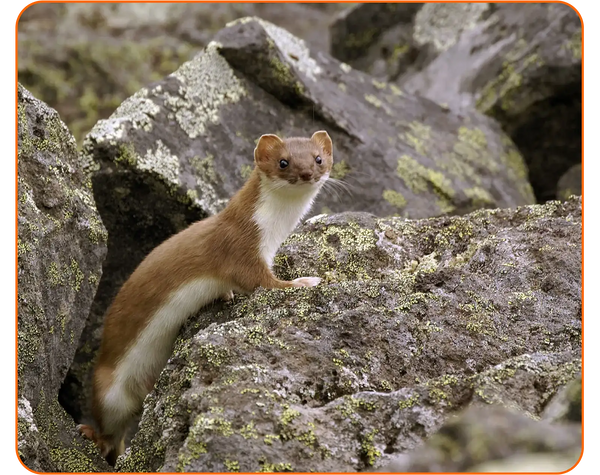Where are All the Small Carnivores?

High above treeline in the West Elk range of the Colorado Rockies, I hopped from one lichen-covered boulder to another. Thawing moisture from the freezing temperatures last night hung in the air, giving everything a humid, almost ethereal quality. My hiking partner and I made our way up the valley, stopping to look at cool rocks covered in dendritic deposits thrown out of the loose mountainside from years past. We moved slowly, more concerned about finding the coolest rock of the trip than making it to our destination at a certain time.

Suddenly, a shrill “squeak!” rang out, piercing the quiet morning air. We froze in place. We knew a sound that adorable could only belong to some sort of small, furry creature, and we were determined to catch a glimpse of it.
Our eyes scanned the boulders around us, straining to spot any movement against the dappled brown and gray background. A flash of brown and white darted between tufts of long grass and alpine wildflowers, two obsidian orbs. There it was. An ermine.

Ermine are small, ferret-shaped rodents, closely related to weasels and minks. Like their close relatives, the black-footed ferret, ermines are an at-risk or endangered species in many areas of the country. The main difference between the two is that ermines were never domesticated, while most breeds of ferrets have been at some point. Ermines in high-elevation areas are also known to change color with the seasons, their coats adapting to match the snow in winter or dirt-colored lichen of summer around them.


While small carnivores like these creatures don’t get as much public attention as large carnivores in the U.S., scientists have been trying to slow their decline for years. These small hunters play an essential role in their ecosystems! Sadly, recent studies are showing that ermine, weasels, and other small carnivore populations have declined as much as 90% in some areas of the U.S. in the last 50 years. And this isn’t just isolated to North America, studies show that they are in decline globally as well.
Scientists are still trying to understand why weasels and other small carnivores are at such high risk of decline, but many believe environmental stressors are the cause – changing temperatures and micro-climates, harmful farming practices, food availability, new disease mutations, domestic animal threats, and competition from other small carnivores more adapted to human development.
Because creatures like the black-footed ferret and ermines are so small, their bodies respond to minor climate changes at a drastic rate. Their lives are shorter than larger carnivores, and they end up having less time than larger mammals to build resilience to habitat change, temperature raises, and food availability. This is very similar to what we see happening with American Pika populations in mountain ranges across the continent.

So what can we do to change what is happening?
Visibility and understanding of these significant ecosystem and biodiversity changes is huge! If we talk about what is happening, more people will know and be motivated to take action. Don’t be afraid to speak out about things you’re passionate about.
Support your local conservation and wildlife programs! Volunteering at places such as this are great experiences for you and help them accomplish more with their valuable time. You can also ask local businesses to donate to these conservation and wildlife preservation programs, or organize fundraising events for them.
Keep reading! Do more research. Ask questions. Reach out to local policy-makers and politicians. Educate yourself about the changes happening in our rapidly-changing world. This is important for your future and the future of the outdoors. Use your knowledge as a force for change!

Opening Image Credit: https://www.britannica.com/








0 comments